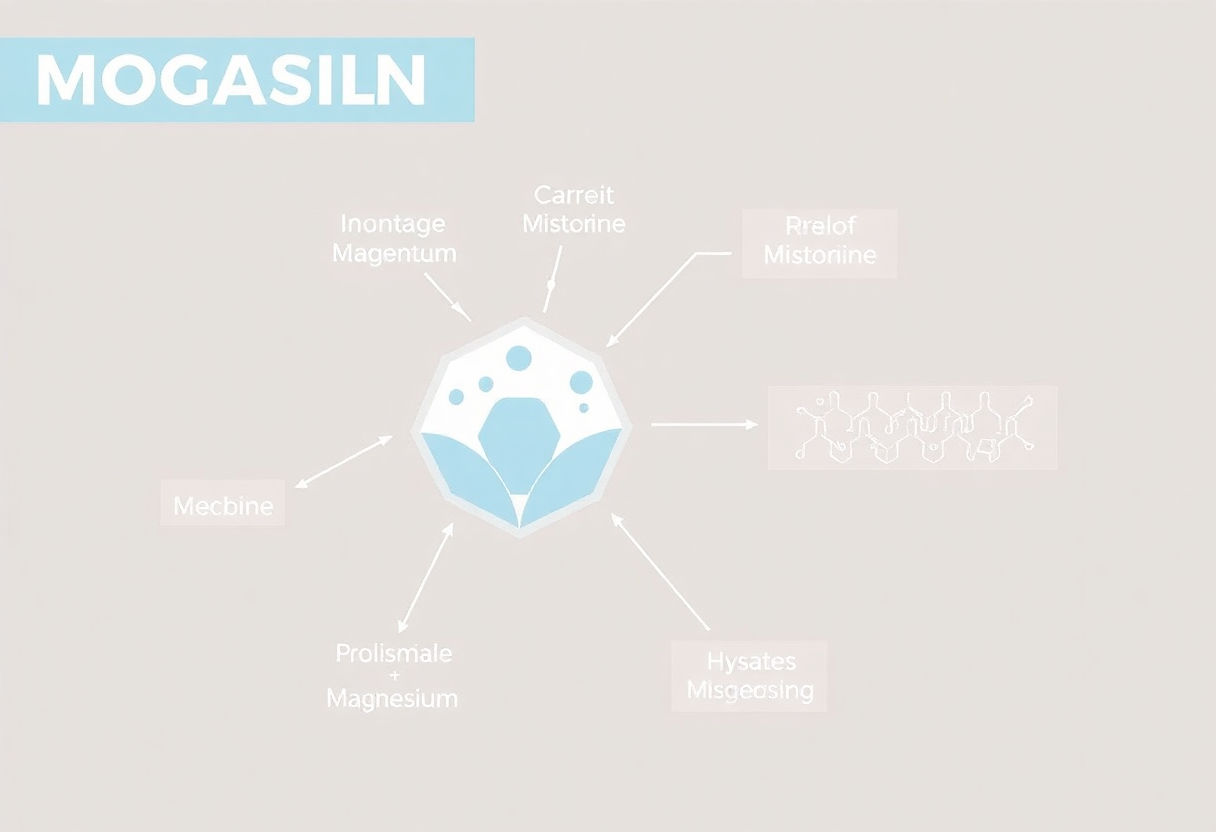Discovering effective remedies for stress and anxiety is crucial in today’s fast-paced world. Magnesium complex emerges as a compelling, natural alternative to conventional treatments, acclaimed for its potential to ease anxiety and bolster emotional well-being. This article will delve into magnesium complex’s composition, its influence on the nervous system, and the critical link between magnesium deficiency and heightened anxiety levels. By comparing its efficacy with other remedies, discussing recommended dosages, and highlighting real-life success stories, we aim to equip you with the understanding and confidence to consider magnesium complex as a valuable ally in managing stress.
Key Takeaways
- Magnesium complex serves as a natural and effective alternative for managing stress and anxiety with fewer side effects compared to conventional treatments.
- It plays a crucial role in regulating the nervous system, promoting calmness and relaxation by influencing neurotransmitter activity.
- Sufficient magnesium intake is essential, as deficiencies are linked to increased anxiety and stress levels, evidenced by scientific research.
- Compared to other remedies, magnesium complex is generally safe and offers a unique mechanism of action for alleviating stress.
- Appropriate usage and dosage of magnesium complex can optimize benefits and reduce the risk of adverse effects.
What is Magnesium Complex?

Magnesium complex is a combination of various forms of magnesium, often complemented by other essential nutrients, that aims to enhance the bioavailability and efficacy of magnesium supplementation. This compound is gaining attention for its potential to alleviate stress and anxiety naturally.
Magnesium itself is a vital mineral that plays numerous roles in bodily functions, crucial among them being the regulation of the nervous system. It has been found that many people exhibit magnesium deficiency, which can exacerbate feelings of stress and anxiety. By offering a combined formulation, a magnesium complex seeks to address these deficiencies more effectively than single-source magnesium supplements.
The primary components of a magnesium complex typically include forms such as magnesium citrate, magnesium glycinate, or magnesium aspartate. Each of these forms has distinct absorption rates and effects on the body, making a complex more versatile in its approach to replenishing magnesium levels.
Furthermore, magnesium complexes are often recommended due to their potential to enhance both physical and mental well-being. They are considered particularly beneficial as they not only support nervous system function but also contribute to muscle relaxation and improved sleep quality. These benefits are integral in managing anxiety and stress levels, creating a holistic approach to mental health.
To understand the comprehensive benefits of magnesium supplementation, including its role in reducing stress, one can reference established health resources, such as the discussions on magnesium complex benefits. Reinforcing the importance of magnesium, these insights underline the substantial contributions of magnesium complex as a natural remedy in the context of stress and anxiety management.
How Magnesium Affects the Nervous System
Magnesium plays a crucial role in maintaining a well-functioning nervous system. It serves as a cofactor in over 300 enzymatic reactions in the body, many of which are essential for nerve transmission. By regulating neurotransmitters, magnesium helps modulate the excitability of neurons, which may play a pivotal role in managing stress and anxiety levels.
One significant way magnesium influences the nervous system is through its ability to stabilize neural activity. This mineral regulates the activity of N-methyl-D-aspartate (NMDA) receptors, which are vital for synaptic plasticity and memory function. An excess of NMDA activity can lead to neuronal damage, contributing to heightened stress responses. By acting as an NMDA antagonist, magnesium helps protect neurons from overstimulation and excitotoxicity.
Additionally, magnesium influences the release and function of gamma-aminobutyric acid (GABA), the primary inhibitory neurotransmitter in the brain. GABA plays a key role in calming neural activity, promoting relaxation, and reducing anxiety. When GABA function is optimal, feelings of anxiety and stress are naturally mitigated.
Furthermore, magnesium is involved in the regulation of the hypothalamic-pituitary-adrenal (HPA) axis, which controls the body’s stress response. Proper magnesium levels can help maintain a balanced HPA axis, reducing the release of stress hormones like cortisol.
Overall, adequate magnesium intake is critical for reducing nerve excitability and promoting a tranquil mental state. For more insights into the multifaceted benefits of magnesium on nerve function, consider exploring the comprehensive resources provided by Magnesium nerve function.
The Link Between Magnesium Deficiency and Anxiety
Magnesium deficiency has been increasingly recognized as a potential contributor to anxiety disorders. Research suggests a significant correlation between low magnesium levels and heightened anxiety symptoms. This relationship hinges on magnesium’s role in neurological functions, influencing both the nervous system and neurotransmitter activity.
Magnesium is pivotal in regulating neurotransmitters that mediate anxiety responses, particularly gamma-aminobutyric acid (GABA), a neurotransmitter known for its calming effects on the brain. Deficient magnesium levels can lead to reduced GABA production, fostering an anxious state. Studies have shown that magnesium deficiency can trigger the hypothalamic-pituitary-adrenal (HPA) axis, resulting in increased cortisol levels, which is another pathway leading to anxiety.
Furthermore, a deficiency in magnesium affects neuroplasticity, altering synaptic functioning and possibly exacerbating anxiety-related neural circuitry. It is worth noting that magnesium’s impact on cellular energy production also plays a role. Inadequate magnesium may result in decreased energy availability for stress response regulation, intensifying anxiety.
Recent studies have confirmed the link between magnesium deficiency and anxiety, highlighting the importance of maintaining adequate magnesium levels for mental health. For instance, a study published in the journal of natural medicine reveals that participants with low magnesium levels experienced notable anxiety relief once they began magnesium supplementation. This indicates an opportunity for utilizing magnesium complex as a proactive measure against anxiety.
In conclusion, ensuring sufficient magnesium intake may be a critical factor in managing anxiety, offering a potential natural remedy for those seeking alternative or supplemental treatment. For more insights, a comprehensive study on the role of magnesium in anxiety can be found in this Magnesium deficiency anxiety research.
Comparison of Magnesium Complex with Other Remedies

In the realm of stress and anxiety remedies, a plethora of options are available, each with its own set of benefits and drawbacks. Magnesium complex stands out for its natural origin and minimal side effects compared to conventional treatments.
Efficacy: Prescription medications, such as SSRIs and benzodiazepines, are commonly prescribed for anxiety relief. While they can be effective, these medications often come with a risk of dependence and withdrawal symptoms. In contrast, magnesium complex works by regulating neurotransmitters that influence mood, potentially offering a safer alternative without the addictive potential.
Safety: Many herbal supplements are touted for stress relief, such as valerian root, kava, and St. John’s wort. Although these remedies are popular, they may provoke adverse interactions with other medications or induce side effects like drowsiness or liver issues. Magnesium complex, however, is generally well-tolerated when taken within recommended doses, with mild gastrointestinal issues being the most notable side effect.
Availability and Ease of Use: Unlike some herbal remedies that might require preparation in specific ways, magnesium complex is easily obtainable in various forms—tablets, powders, and capsules—making it a convenient choice for daily supplementation.
While each individual may respond differently, the low risk of side effects and the natural approach provided by magnesium complex make it a compelling consideration for those seeking to manage stress and anxiety.
Recommended Dosage and Usage

When considering magnesium complex as a natural remedy for stress and anxiety, it is crucial to adhere to recommended dosages to maximize benefits and minimize potential side effects. The appropriate dosage can vary based on individual health needs, age, and specific conditions, but general guidelines can provide a useful starting point.
For adults, a daily intake of 310-420 mg of magnesium is often suggested, depending on factors such as age and gender. This range encompasses both dietary sources and supplements. It’s important to consult a healthcare professional to determine the exact dosage that best suits your needs, as too much magnesium can lead to adverse effects. Individuals with certain medical conditions or those on specific medications may require a tailored approach.
Magnesium complex supplements typically combine various forms of magnesium, such as magnesium citrate, magnesium glycinate, and magnesium oxide. This combination aims to enhance absorption and efficacy in calming the nervous system and alleviating anxiety symptoms.
When incorporating a magnesium supplement into your routine, consistency is key. It is advisable to take supplements at the same time each day, preferably with meals to aid absorption and reduce the risk of digestive discomfort.
For more detailed recommendations on magnesium supplement dosage, please refer to reliable resources such as magnesium supplement dosage.
To ensure optimal results, consideration of dietary sources of magnesium, such as leafy greens, nuts, and whole grains, can complement supplement intake. Balancing both supplemental and dietary magnesium can play a significant role in managing stress and anxiety naturally.
Potential Side Effects and Precautions

While magnesium complex is generally considered safe for most individuals, it’s important to be aware of potential side effects and necessary precautions when integrating it into your health regimen. Some individuals may experience mild digestive disturbances, including:
- Diarrhea
- Nausea
- Abdominal cramping
These symptoms are more likely to occur when magnesium is taken in high doses.
Individuals with certain medical conditions should exercise caution. For instance, those suffering from kidney disease should consult a healthcare provider before using magnesium supplements. The kidneys are responsible for filtering out excess magnesium, and impaired function could lead to dangerously high levels in the body.
Medication interactions are another consideration. Magnesium can interact with several types of medications, potentially altering their effectiveness. This includes:
- Antibiotics
- Blood pressure medications
- Muscle relaxants
To avoid negative interactions, it’s advisable to separate the intake of magnesium supplements and these medications by at least two hours.
Pregnant or breastfeeding women should also consult their healthcare provider before starting magnesium supplements to ensure they are taking an appropriate and safe dosage for themselves and their children.
Lastly, it’s essential to adhere strictly to the recommended dosage. Although magnesium toxicity is rare, excessive intake could lead to serious health issues, including heart problems and respiratory distress. Always follow guidance from a healthcare professional to ensure safe consumption.
In summary, while magnesium complex offers promising benefits in managing stress and anxiety, understanding these potential side effects and taking appropriate precautions can help maximize its benefits safely.
Real-life Success Stories

Jane, a software engineer from California, found herself overwhelmed by the continuous pressure of meeting work deadlines. Despite trying various therapies, nothing seemed to alleviate her anxiety until she discovered magnesium complex. “Incorporating magnesium into my daily routine made a profound difference,” Jane shares. “I noticed a significant reduction in my stress levels within weeks.”
Similarly, Robert, a teacher from Texas, faced chronic stress and experienced frequent anxiety attacks. After reading about magnesium’s effects, he decided to try it. “The results were astonishing,” says Robert. “I felt calmer and could manage my classroom stress effectively. It enhanced my overall quality of life without the side effects I experienced from traditional medications.”
Another compelling story comes from Melissa, a college student in New York, who battled anxiety due to academic pressures. Her turning point came after trying magnesium supplements. “It was a game-changer,” Melissa declares. “I was skeptical at first, but my stress was manageable, and my sleep quality improved.”
These accounts exemplify the potential of magnesium complex as a natural alternative for stress and anxiety management. Individuals who have integrated it into their daily regimen report:
- Enhanced relaxation and calmness
- Improved sleep quality
- Better coping mechanisms against stress triggers
These personal stories underscore the importance of magnesium in stress relief, providing both psychological and physical benefits. While not a one-size-fits-all solution, these testimonials highlight its potential as a complementary approach to traditional treatments, offering hope and tangible results for those seeking a natural remedy.
Conclusion
Magnesium complex emerges as a promising natural remedy for mitigating stress and anxiety, owing to its crucial role in the nervous system. Highlighting connections between magnesium deficiency and heightened anxiety, the complex offers a safer option compared to other remedies with fewer side effects. Looking forward, rigorous research could further establish magnesium’s efficacy, potentially transforming stress management approaches. For those considering magnesium complex, adhering to recommended dosages and understanding possible interactions is key to reaping its benefits. Embrace this natural solution, integrating it wisely into your wellness strategy for improved mental health.
Frequently Asked Questions
What is a Magnesium Complex, and how does it help with stress and anxiety?
A magnesium complex is a combination of different forms of magnesium, which can provide a more balanced absorption. It helps alleviate stress and anxiety by playing a crucial role in neurotransmitter regulation and supporting the nervous system.
Can everyone use Magnesium Complex supplements?
While generally safe for most people, magnesium supplements should be used with caution by those with kidney problems or those taking certain medications. It is advisable to consult a healthcare professional before starting any new supplement regimen.
How quickly can I expect to see results from taking Magnesium Complex?
Improvements in stress and anxiety levels can vary among individuals, but many people report feeling benefits within a few weeks of consistent use. Adherence to the recommended dosage is essential for optimal results.
Are there any side effects associated with Magnesium Complex?
Typically, magnesium complex is well-tolerated; however, some individuals may experience mild gastrointestinal issues like diarrhea or stomach upset. To minimize these effects, start with a lower dosage and gradually increase as needed.
Can Magnesium Complex be taken with other supplements?
Magnesium complex is generally safe to take with most supplements but can interact with certain medications like antibiotics and blood pressure drugs. It is important to manage supplement intake carefully and consult a healthcare provider as necessary.
